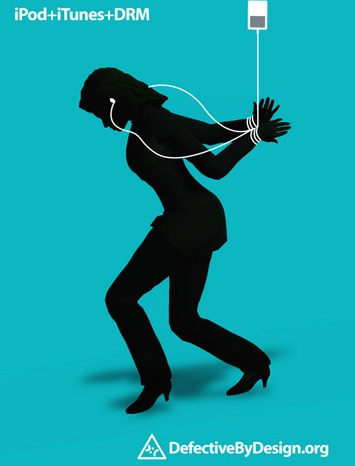Did Apple Really Sell 10 Billion Songs On iTunes?
Apple’s breaking out the Champagne over the 10 billionth song downloaded from iTunes, which turns out to be “Guess Things Happen That Way” by Johnny Cash. Yeah, mazel tov, Apple. Thing is, most of the media are reporting that Apple’s sold a billion songs, and that’s simply not the case. Why? Oh, just a little thing called digital-rights management, which was included with at least 3 billion of those songs.
Before Apple embraced the light and launched iTunes Plus in 2007, every song “sold” on iTunes was locked by DRM, and backed by a licensing agreement, which made copying those songs to more devices than Apple allowed, or transcoding them to a different format, a breach of contract. As market researcher Rob Enderle said back in 2006, “Owning implies control and if you bought the tracks on iTunes you don’t have complete control.” And Reuters’ Duncan Martell explained the non-ownership issue pretty clearly:
Apple’s FairPlay digital rights management, or DRM, software prevents you from listening to those purchased songs on a music player from Dell Inc., Creative, Sony, or others. The same thing goes for songs you’ve imported to your computer from CDs you already own.
The DRM software is Apple’s way of preventing piracy and is a large part of the reason why the recording industry has so warmly embraced the iTunes Music Store.
…Beyond just having songs you bought from iTunes “trapped” on the iPod and in iTunes, it’s also not a snap to move songs from an iPod – whether you bought them or initially pulled them off a CD – back up to a computer. While it’s possible to do so, Apple doesn’t make it easy, right off the bat, because it’s trying to discourage piracy.
So, how many songs has Apple actually sold, using that quaint, old-fashioned, definition of selling? The iTunes store hit 3 billion downloads in July 2007, shortly after iTunes Plus was launched. However, DRM wasn’t removed from every song in the store until two years later, around the time it hit the 6 billion mark. That likely puts the total “sold” at somewhere around 5 billion, given that between 2007 and 2009, the number of DRM-free songs steadily increased.
As to the other 5 billion, well, they’re still covered by DRM. Want to really own any of those you’ve got on your computer? Apple is happy to sell you an “upgrade” for 30 cents per song — or you can do what iTunes customers used to do regularly, and burn them to a CD, after which you pretty much do anything you want, as long as you don’t mind breaking your licensing agreement. Don’t worry. We won’t tell.
Update: I’m glad to see so much debate going on in the comments, and I wanted to make sure that I’m making my point clearly, since some commenters have raised some very good questions. Apple, as a company, has been very honest about the way it markets music, and has consistently referred to “downloads,” rather than sales. However, this distinction has been lost on much of the media, who refer to iTunes as having “sold 10 billion songs,” when that’s simply not the case. What Apple did in the pre-iTunes Plus era, was to “re-allocate copyright entitlements” through license agreements with consumers, as the Berkman Center put it in 2006.
Some commenters also point out that, by my logic, any “sale” of intellectual property isn’t actually a sale as such, because it’s limited by copyright. However, when a book, CD, work of art, etc., is sold, the purchaser has far more rights than does the licensee of a DRM-protected song. These items can be resold, given away, and in some cases, even copied under limited circumstances. That’s not the case with DRM-protected content.
Ultimately, I believe it is important to raise these issues, even if some feel it’s a pointless semantic exercise. If I’m resorting to using a very literal definition of what it is to “sell a song,” I’m doing so in the service of advancing the discussion of what it truly means to own something in the digital age, and I’m glad I’ve been able to get so much passionate feedback by doing so.
10 billionth song sold by Apple’s iTunes [AP]
Do you own songs bought online? Well, sort of [Reuters]
Want more consumer news? Visit our parent organization, Consumer Reports, for the latest on scams, recalls, and other consumer issues.


